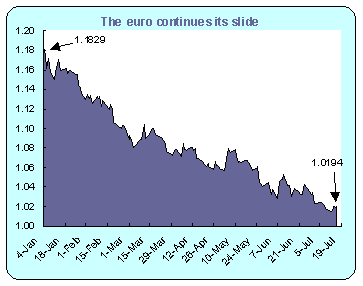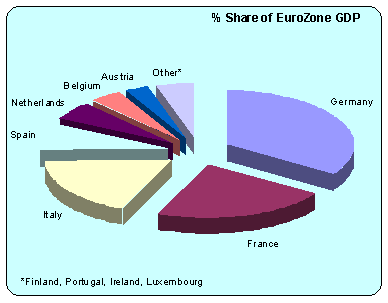
|
Today's Calendar |
| | Simply Economics |
| | International Perspective |
| | Resource Center |
 |
|
| 1999 Articles |
|
International Perspective
The European Economic and Monetary Union (EMU) is already having a major impact on the world economy, international trade relations and global financial markets. The "eurozone" or "euroland" includes 11 European nations and will eventually rival the size of the U.S. economy as well as U.S. trade volumes. The eleven countries are Germany, France, Belgium, Luxembourg, Finland, Italy, Spain, Portugal, Ireland, Netherlands and Austria. Four members of the Economic Union (EU) chose not to participate in EMU. Denmark, Sweden, and the United Kingdom did not join at this time because of strong domestic and political opposition. Greece did not meet the inflation target set for entry to the EMU, but is working towards the next possible entry date in 2001. The European Central Bank is responsible for member country monetary policy and their new currency, the euro. In the six months since the inception of the European Monetary Union, the euro has headed downward, losing about 14 percent of its value against the U.S. dollar. Introduced with great fanfare at the beginning of this year, the euro was attributed with virtually unlimited powers. What has happened in a way has been no surprise.  The European Central Bank (ECB) has permitted market forces to prevail and the euro to fall. It has refrained from any foreign exchange intervention on behalf of the euro. (The ECB, along with three other central banks, did intervene in the foreign exchange market at the request of the Bank of Japan at the end of June to help keep the value of the yen at about 120 to the dollar.) The markets take seriously all comments about the euro - especially the negatives. There are perceptions that the politicians and central bankers within the EMU disagree. To counter this, Ecofin (Economic and Financial Committee), at their meeting last week named the head Ecofin finance minister and the president of the European Central Bank, Wim Duisenberg, to be spokesmen for the euro. The ECB focus is inflation and the most watched data are the harmonized Consumer Price Index as calculated by Eurostat, the statistical agency for the EU and ECB. National CPI rates, which differ from the harmonized rate, continue to be calculated. Recently, the main reason given for the euro's decline is sagging European growth when compared with the United States - especially in Germany and Italy. Chronic unemployment and other deep-seated structural problems have exacerbated the EMU's woes. Another contributing factor to the euro's decline was the appreciation of the euro in the last half of 1998 in a "pre euro euphoria". The euro's weakness therefore, is perceived to be a natural consequence of the general economic trends plus temporary factors such as the conflict in Kosovo.
Analysts say that a cheaper euro is just what Europe needs to revitalize its economy. Whether the euro regains its dollar launch level of 1.18 depends on European cyclical developments. Further, the euro's fate could be jeopardized by problems with the Stability and Growth Pact, which mandates that budget deficits in EMU members stay below three percent of GDP. Italy especially is vulnerable. Recent German data indicate that its economy is still faltering. Germany is widely considered to be the engine of the euro project. European officials seem calm about the notion of the euro/dollar parity - that is, a one to one relationship with the dollar. The weaker euro can help boost the eurozone economy by making its products cheaper and more attractive internationally. However, since a large proportion of its exports are absorbed within eurozone borders, it is imperative to Europe - if is to expand growth - that the United States continues to absorb their exports absent strength in other world markets. 
Fiscal policy
Financial Markets
Bonds
Equities Eight European stock exchanges who are developing a platform to trade shares of the top 300 European companies are under intense pressure to complete the "superbourse" before the technological revolution changes the way shares are traded and make it obsolete. The eight exchanges - London, Frankfurt, Paris, Brussels, Amsterdam, Milan, Madrid and Zurich - are trying to harmonize their technology and their operating rules so that these pan-European companies can be traded seamlessly across countries.
What does it mean to U.S. investors? For the investor, the prospect of seamless and more sophisticated stock and bond markets should open up many new investment opportunities. It will be easier to evaluate industry and company performance across Europe. In short, if the euro works, Europe will be stronger and more prosperous and will provide more investment opportunities to investors throughout the world. If it doesn't, it will be poorer and more divided. Looking ahead...
This week is a big week for merchandise trade data.
United Kingdom and Canada will release retail sales on July 21st. Japan will release minutes of monetary policy committee meeting of June 14th on July 22nd. Eurostat will release the harmonized consumer price index (HICP) for the EMU 11 on July 22nd. There are no major German indicators being released this week. |
||||||||||||||||||||||||